Applications for 2025 entry are now open. Applications will close on 28th January 2025.
Overview
The MPhil in Planning, Growth and Regeneration is an intensive ten-month taught programme that provides relevant skills to professionals involved in managing local economic growth and regeneration, regulating land use, and undertaking strategic planning.
Spatial disparities in economic growth and development have been an entrenched feature across the globe. In the United Kingdom devolution and place-based policymaking have underscored the critical role of effective strategic planning for spatial, industrial and environmental development. In Asia and Africa the unprecedented urbanisation and the rise of mega city regions bring about new challenges for planning for sustainability. Technological advancements and crises such as climate change and pandemics are generating and accelerating trend changes in cities and towns. There is an increasing need for experts with the capability to manage growth and disruptive changes of various scales through cooperation with a wide range of professionals and stakeholders, and with an international perspective.
The course aims to provide advanced skills training for understanding the complex nature of planning, growth and regeneration issues, and for developing transdisciplinary skills for devising and assessing spatial planning solutions.
The MPhil in Planning, Growth and Regeneration involves an intensive period of full time study. The programme may also serve as an entry point into PhD training for those interested in pursuing research in planning, growth and regeneration in greater depth.
What's special about this course?
A modular structure enable you to focus your interests - you will gain a foundation in research methods. You can choose from a variety of options based on your own interests.
Our academics - you are taught by researchers and academics who study these subjects and are experts in their field
The Cambridge teaching system - supervision - weekly supervisions in College are the focal point of the academic week, providing personal supervision and the opportunity to debate with and learn from academics. You write essays or prepare work for these sessions and get guidance, support and feedback.
The Cambridge teaching system - supervision - small-group teaching provides the opportunity to debate with and learn from academics. You write essays or prepare work for these sessions and get guidance, support and feedback.
Course structure
The structure of the course is modular. Tuition in the programme is based around classroom lectures, case studies and field trips to ensure students can apply the theoretical concepts taught. There are normally two one-hour lectures per week, per module. These lectures may be supplemented and/or replaced by seminars and/or workshops.
You are required to:
- Complete 10 units over the academic year including the two core pathway modules
- Select 1 optional module in the Michaelmas Term and 2 in the Lent term
- Complete a 10,000 word dissertation in a relevant topic of your choice. Your dissertation is supervised by one of our academics
- Attend the Research Management Programme that supports the development of projects for the dissertation and covers issues of data collection and ethics
You will be required to take the following compulsory modules which will count towards the 10 units over the academic year:
PGR01 - Urban and environmental planning (Michaelmas and Lent Term) (2 units)
PGR02 - Urban and housing policy (Michaelmas and Lent Term) (2 units)
RM01 - Mixed research methods (Michaelmas Term) (1 unit)
Dissertation, Research Design, and Structure (Michaelmas Term) (2 units)
RM02 - Further topics in quantitative methods (Lent Term) (1 unit)
RM03 - Spatial Analysis and Modelling (Lent Term) (1 unit)
EP06 - Energy and climate change (Lent Term) (1 unit)
EP07 - National, Comparative, and European Environmental Law and Policy (Lent Term) (1 unit)
PGR03 - Spatial economics (Michaelmas term) (1 unit)
PGR04 - Institutions and development (Michaelmas Term) (1 unit)
PGR05 - Place-based policy (Lent Term) (1 unit)
RE03 - Real estate development process (Lent Term) (1 unit)
RE04 - The macroeconomy and housing (Michaelmas Term) (1 unit)
RE05 - Legal Issues in Land Use and Finance (Lent Term) (1 unit)
The Course Director for the MPhil in Planning, Growth and Regeneration is Dr Li Wan and the Deputy Director is Dr Davide Luca. They are available to discuss with students issues specific to the Planning, Growth and Regeneration programme.
Finding out more
-
How supervisions work
Depending on the modules taken, students may have group supervisions supplementary to lectures.
In addition to those, you will be assigned to supervisors during the Michaelmas Term after initial dissertation summaries are submitted. The Department seeks to allocate a supervisor able to provide guidance on the chosen research topic and who has similar disciplinary interests to the
candidate. The University’s recommendation is that formal supervision meetings should take place minimum of twice a term. However, in the Department’s experience much greater frequency is usually required, particularly because the time frame for completion of the MPhil dissertation is short. -
More on how the course is assessed
The examining schemes are approved from year to year, and are therefore liable to variation. Approved schemes will be made available at the start of the academic year.
Assessment of each module is by way of a written examination paper, project or essay work, or a combination of these methods. Examinations are normally in January for Michaelmas Term modules and in April for Lent Term modules. Each module accounts for 10% of the overall mark and the dissertation accounts for 20% of the overall mark.
-
Progressing onto a PhD
MPhil candidates wishing to pursue a PhD with the Department may apply to continue as a Graduate Student via the Board of Graduate Studies. Each application is considered carefully by the Department and by the Degree Committee. Approval of an application will depend on three criteria:
- availability of a supervisor;
- the approval by the Degree Committee of a research proposal; and
- the achievement of a minimum overall mark and minimum dissertation mark in the MPhil examination as prescribed by the Degree Committee.
Full details of the application procedure for continuing students are given on the Graduate Admissions Office website. Students wishing to continue are advised to apply early in the academic year and to be aware that funding deadlines are also often early in the applications cycle. In all cases, approval to continue is subject to the final examinations results and approval from the Degree Committee.
-
Professional accreditation
The MPhil in Planning, Growth and Regeneration is accredited by the Royal Institution of Chartered Surveyors (RICS).
The RICS is an international organisation with over 100,000 members and membership of the RICS conveys a number of benefits. Graduates of the Planning, Growth and Regeneration course are eligible to enter the Assessment of Professional Competence (APC), successful completion of which entitles full membership of the RICS. The RICS also offers free membership to students whilst they are taking accredited courses.Information about the RICS, the APC and the benefits of membership can be found at: www.rics.org
Boyce Family Scholarship
The Boyce Family Scholarship covers the fees for one full-time, one-year MPhil student. It is open exclusively to students who are normally resident in North America (including the Caribbean) and South America. Preference will be given to the following:
- Students from backgrounds underrepresented at postgraduate level in their field of study, in the first instance, to women and students from racially minoritized backgrounds.
- Who are pursuing an MPhil in Land Economy, or another course in the social sciences with a focus on the built environment, sustainability, and/or conservation.
Mastercard Foundation Scholars Program
The Mastercard Foundation Scholars Program at Cambridge is designed to provide students from under-represented communities in Africa with fully-funded opportunities to complete their master’s training, grow in transformative leadership, and contribute to climate resilience and sustainability.
The programme covers full tuition costs, a monthly maintenance allowance and a laptop. Other costs covered include visa application fees, International Health Surcharge, and travel costs.
As part of the application process, prospective scholars will be required to provide a supplementary statement that indicates their personal commitment to contributing to climate-resilience and sustainable futures for Africa.
Career destinations and opportunities

Meet some of our students and visiting scholars and their experiences during and after the course
Find out what it is like to study at Cambridge, how things work and meet some of our students

Where our postgraduates go
Find out where a degree from the Department of Land Economy could take you...

